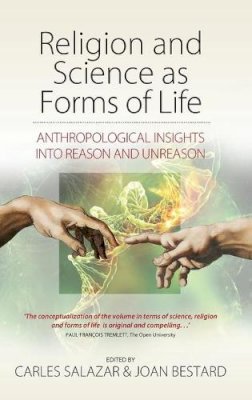
Stock image for illustration purposes only - book cover, edition or condition may vary.
Religion and Science as Forms of Life: Anthropological Insights into Reason and Unreason
Carles Salazar (Ed.)
€ 156.19
FREE Delivery in Ireland
Description for Religion and Science as Forms of Life: Anthropological Insights into Reason and Unreason
Hardback. The purpose of this volume is to analyze the relationships, possible articulations and contradictions between religion and science as forms of life: ways of engaging human experience that originate in particular social and cultural formations. Editor(s): Salazar, Carles; Bestard, Joan. Num Pages: 248 pages, black & white illustrations. BIC Classification: HRAM3; JHMC. Category: (UP) Postgraduate, Research & Scholarly. Dimension: 237 x 158 x 21. Weight in Grams: 512.
The relationships between science and religion are about to enter a new phase in our contemporary world, as scientific knowledge has become increasingly relevant in ordinary life, beyond the institutional public spaces where it traditionally developed. The purpose of this volume is to analyze the relationships, possible articulations and contradictions between religion and science as forms of life: ways of engaging human experience that originate in particular social and cultural formations. Contributions use this theoretical and ethnographic research to explore different scientific and religious cultures in the contemporary world.
Product Details
Publisher
Berghahn Books
Format
Hardback
Publication date
2015
Condition
New
Weight
511 g
Number of Pages
238
Place of Publication
Oxford, United Kingdom
ISBN
9781782384885
SKU
V9781782384885
Shipping Time
Usually ships in 15 to 20 working days
Ref
99-15
About Carles Salazar (Ed.)
Carles Salazar is Professor of Social and Cultural Anthropology at the University of Lleida. He received his PhD from the University of Cambridge and has carried out ethnographic fieldwork on cooperation, religion and kinship. His publications include Anthropology and Sexual Morality. A Theoretical Investigation (Berghahn, 2006) and European Kinship in the Age of Biotechnology, co-edited with Jeanette Edwards (Berghahn, 2009).
Reviews for Religion and Science as Forms of Life: Anthropological Insights into Reason and Unreason
“The publication of this volume marks a rich addition to long-established anthropological fields of magic, religion, and science. More importantly, however, the book is an important, much-needed injection to arguably sidelined anthropological fields of belief, disbelief, and, relatedly, unresolved contradiction.” • Journal of the Royal Anthropological Institute (JRAI) “The contributors accomplished what they set out to do. They crossed disciplinary lines, exchanging and cross-referencing essays, while maintaining functionality in their own areas of expertise. The book produces an enlightening and fruitful conversation about religion and science as forms of life. It is especially recommended for academic classrooms to encourage critical reasoning and debate.” • International Social Science Review “Religion and Science as Forms of Life: Anthropological Insights into Reason and Unreason brings together various theoretical positions from which to consider how forms of knowledge are articulated, opposed or mingled together, and their impact in different social settings. It is of special interest for academics in the field of anthropology and sociology of religion, but it can also be of particular relevance to anyone interested in analyses that explore the categories of ‘superstition’ and ‘belief’.” • Anthropological Forum “Drawing on an eclectic range of ethnographic, empirical and theoretical sources, this book is a fascinating and timely contribution to contemporary scholarly debates about that most troubled of interfaces, between religion and science.” • Alexander Smith, The University of Warwick “The conceptualization of the volume in terms of science, religion and forms of life (although public life might also work) is original and compelling as a means of exploring the complex terrains and scales at which religion and science meet, are received and transform one another.” • Paul-François Tremlett, The Open University
